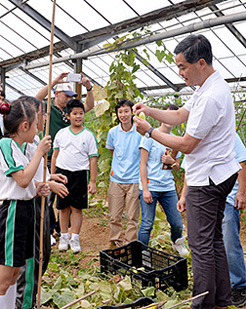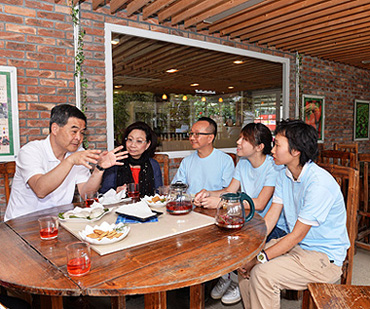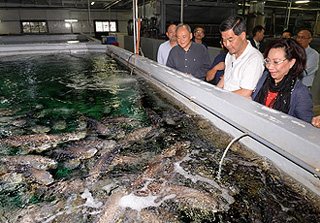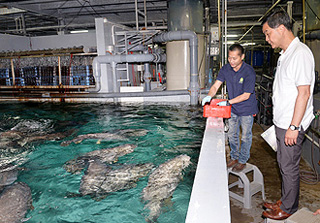
|
Sustainable development of agriculture and fisheries industriesThere is an old Chinese saying which says that when a series of changes has run its course, another change ensues. When that change finds a free course, it can go very far. It means that when faced with difficulties, those who are willing to change direction can always break new ground and continue to develop and thrive. Yesterday, my wife Regina and I visited an organic farm and a marine fish farm. Their development embodies the wisdom of this saying. In recent years, green living has become all the rage. Many farmers who used to be solely engaged in farming have converted their farms into leisure farms, which not only produce crops but also serve recreational and educational purposes. There are currently about 120 leisure farms open to the public. Yesterday, we first went to Pat Heung, Yuen Long, to visit an organic farm run by the Hong Kong Federation of Youth Groups as a social enterprise and exchanged gardening tips with the young people there. The farm, 15 000 square metres in area, grows a variety of vegetables and herbs, as well as edible cactus, which is rarely seen in the market. Aiming to promote environmental protection and sustainable development, the farm mainly receives group visits by organisations such as schools and elderly centres. Last year, a total of 18 000 people visited the farm. It is hoped that by briefly experiencing the hard work and joy of farming, visitors will realise that food does not come easily, so that they can cherish resources and avoid wasting them. During the visit, I came across a group of primary students and was pleased to see that they found farming interesting. I was also glad to see some young faces among those working there. The farm's project manager Izzi told me that leisure farming has potential for development since more and more people care about the ecosystem and the environment. She also said that she enjoys her job very much because it is meaningful to enhance environmental awareness among young people. After that, we went to a large-scale indoor giant grouper farm at Lau Fau Shan. Its owners used to import live marine fish and rear fish in rafts. However, in view of overfishing, pollution and rising operating costs and fish prices, they turned to high-tech aquaculture 10 years ago. The fish farm has an area of 2 700 square metres and an annual production of 70 000 to 80 000 giant groupers, which are supplied to local hotels, fine-dining restaurants and supermarkets. In collaboration with a local university, the fish farm introduced an indoor recirculating aquaculture system at the farm to remove impurities from the tanks. While ensuring clean water supply, this system can save both energy and water through recycling. We should support and encourage the development of the local agriculture and fisheries sector towards high technology, diversification and sustainability. In my Manifesto, I proposed that we review the integrated social values of the agriculture and fisheries industries in Hong Kong, promote and support multifunctional agricultural activities, and establish a fund to provide Hong Kong fishermen with skills and training in new methods of operation besides traditional fishing. Hong Kong is small and densely populated but there is still a considerable amount of agricultural land and green belt areas. The Government will continue to work with the agriculture and fisheries sector to explore the direction of sustainable development. November 18, 2013
|
|||||||||||||||||
|






